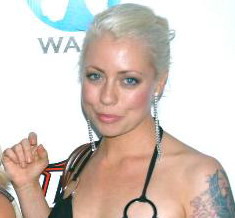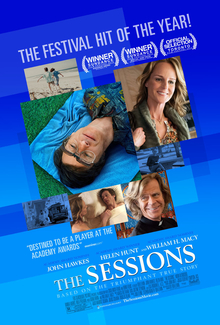Related Research Articles
Scarlet Alliance is Australia's national peak sex worker organisation. It was formed in 1989. As an organisation maintained entirely by current and former sex workers, Scarlet Alliance aims to achieve equality, social, legal, political, cultural and economic justice for workers in the sex industry.

Prostitution in Australia is governed by state and territory laws, which vary considerably, although none ban the selling of sex itself.

Luke Eve is an Australian screen director and producer. Originally a freelance photographer, he transitioned into directing music videos and commercials before moving into film and television. Eve was the winner of Tropfest 2005 with his film Australian Summer. He was the series director of SEX: An Unnatural History and the 2012 ABC series Great Southern Land. In 2014, he created, produced, and directed the ground-breaking, critically acclaimed series Low Life, a black comedy about depression starring Henry Nixon and Claire van der Boom.
The World Charter for Prostitutes' Rights is a declaration of rights adopted in 1985 to protect sex workers' rights worldwide. It was adopted on 15 February 1985 at the first World Whores Congress in Amsterdam by the newly formed International Committee for Prostitutes' Rights (ICPR). The Charter established a human rights-based approach to prostitution, demanding that sex workers be guaranteed freedom of speech, travel, immigration, work, marriage, motherhood, health, and housing, amongst other things. This approach has subsequently been further elaborated by the sex workers' rights movement.

Sexuality and disability is a topic regarding the sexual behavior and practices of people with disabilities. Like the general population, these individuals exhibit a wide range of sexual desires and adopt diverse methods of expressing their sexuality. It is a widespread concern, however, that many people with disabilities do not receive comprehensive sex education, which could otherwise positively contribute to their sexual lives. This roots from the idea that people with disabilities are asexual in nature and are not sexually active. Although some people with disabilities identify as asexual, generalizing this label to all such individuals is a misconception. Many people with disabilities lack rights and privileges that would enable them to have intimacy and relationships. When it comes to sexuality and disability there is a sexual discourse that surrounds it. The intersection of sexuality and disability is often associated with victimization, abuse, and purity.
The Australian Classification Board is an Australian government statutory body responsible for the classification and censorship of films, video games and publications for exhibition, sale or hire in Australia.
EQ Media Group, formerly Essential Media Group (EMG), is a global television production company with production and development hubs in Los Angeles, California; Sydney, Australia; Auckland, New Zealand; and Vancouver, Canada.
Surrogate partners, formerly referred to as sex surrogates, are practitioners trained in addressing issues of intimacy and sexuality. A surrogate partner works in collaboration with a talk therapist to meet the goals of their client. This triadic model, composed of the client, talk therapist, and surrogate partner therapist is used to dually support the client and the surrogate partner therapist. The client engages with the surrogate partner therapist in experiential exercises and builds a relationship with their surrogate partner therapist while processing and integrating their experiences with their talk therapist or clinician.

Lorelei Lee is an American pornographic actor and writer. Lee is non-binary.

The Sessions is a 2012 American drama film written and directed by Ben Lewin. It is based on the 1990 article "On Seeing a Sex Surrogate" by Mark O'Brien, a poet paralyzed from the neck down due to polio, who hired a sex surrogate to lose his virginity. John Hawkes and Helen Hunt star as O'Brien and sex surrogate Cheryl Cohen-Greene, respectively.

Craig Graham is an Australian producer of television shows such as "The Embassy", 2014 Channel 9. "Air Rescue", 2013 Channel 7. "Hatch, Match and Dispatch", 2016 ABC. "Moment of Truth", 2016 ABC iView. "Maurice's Big Adventure", 2016 ABC Kids. "The Justine Clarke Show", 2017 ABC Kids. RPA,Once Upon a Time in Cabramatta, The Great Outdoors, Border Security, Zumbo, and Contract Killers.

Violeta Ayala is a Bolivian-Australian Quechua filmmaker, artist and technologist. Her credits include Prison X – The Devil & The Sun (2021) and the documentaries La Lucha (2023), Cocaine Prison (2017), The Fight (2017), The Bolivian Case (2015), and Stolen (2009).

Nefarious: Merchant of Souls is a 2011 American documentary film about modern human trafficking, specifically sexual slavery. Presented from a Christian worldview, Nefarious covers human trafficking in the United States, Western and Eastern Europe, and Southeast Asia, alternating interviews with re-enactments. Victims of trafficking talk about having been the objects of physical abuse and attempted murder. Several former prostitutes talk about their conversion to Christianity, escape from sexual oppression, and subsequent education or marriage. The film ends with the assertion that only Jesus can completely heal people from the horrors of sexual slavery.

Blackfella Films is an Australian documentary and narrative film production company headquartered in Sydney, founded in 1992 by Rachel Perkins. The company produces Australian short and feature-length content for film and television with a particular focus on Indigenous Australian stories. Its productions have included the documentary series First Australians and The Australian Wars, the documentary film The Tall Man, the television film Mabo, and the drama series Redfern Now and Total Control.

The Case Against 8 is an American documentary film, which premiered at the 2014 Sundance Film Festival on January 18, 2014. Directed and produced by Ben Cotner and Ryan White, the film documents the legal battle to overturn California's Proposition 8, focusing in particular on behind-the-scenes footage of David Boies and Theodore Olson during the Perry v. Schwarzenegger case.

Gayby Baby is a 2015 Australian documentary film directed by Maya Newell that follows four children raised by same-sex parents.
Anna Broinowski is a Walkley Award-winning documentary filmmaker and author.

Ian David Darling is a documentary film director and producer.

Sophie Hyde is an Australian film director, writer, and producer based in Adelaide, South Australia. She is co-founder of Closer Productions and known for her award-winning debut fiction film, 52 Tuesdays (2013) and the comedy drama Animals (2019). She has also made several documentaries, including Life in Movement (2011), a documentary about dancer and choreographer Tanja Liedtke, and television series, such as The Hunting (2019). Her latest film, Good Luck to You, Leo Grande, premiered at the Sundance Festival in 2022. Her upcoming film Jimpa stars Olivia Colman and John Lithgow.
The Final Quarter is a 2019 Australian documentary, directed by Ian Darling and produced by Shark Island Productions, about the final stages of the Australian football career of Adam Goodes, during which he was the target of repeated booing by opposition fans.
References
- ↑ listing. "Paradigm Pictures Pty Ltd". Screen Australia. Retrieved 26 March 2014.
- 1 2 Program. "Sydney Film Festival launches 2011 program". If.com. Retrieved 26 March 2014.
- 1 2 3 Ms Bresnan. "Legislative Assembly for the ACT: 2012 Week 5 Hansard (2 May) . . Page.. 1890." ACT Legislative Assembly Hansard. Retrieved 25 March 2014.
- 1 2 Elliott, Tim (28 November 2011). "Sexual Healing". Sydney Morning Herald. Retrieved 25 March 2014.
- 1 2 Luke Malone (30 November 2011). "The Awesome Sex Worker Who Loves Disabled Clients". Jezebel. Retrieved 2 March 2014.
- ↑ "About Us > History > Small beginnings". Touching Base Inc. Touching Base Inc. 2014. Retrieved 17 February 2014.
- ↑ Kermode, Val. "A study in scarlet". Eye for Film. Retrieved 26 March 2014.
- 1 2 Tim Elliott (28 November 2011). "Sexual healing". Sydney Morning Herald. Retrieved 17 February 2014.
- ↑ Sarah Whyte (11 November 2012). "A touch of kindness". Sydney Morning Herald. Retrieved 7 March 2014.
- ↑ Green, Shane (December 2012). "Willing & Able". The Age. Retrieved 25 March 2014.
- ↑ Zack Carlson (19 March 2012). "SXSW Movie Review: SCARLET ROAD". Badass Digest. Badass Digest. Retrieved 2 March 2014.
- ↑ Erin Tatum (20 January 2014). "'Scarlet Road': Sex Work and Disability". Bitch Flicks. Bitch Flicks. Retrieved 2 March 2014.
- 1 2 Events. "Sexuality and disability expo". Northcott. Archived from the original on 26 March 2014. Retrieved 26 March 2014.
- ↑ Novak, Lauren (26 March 2012). "Disabled deserve the joy of sex". Adelaide Now. Retrieved 26 March 2014.
- ↑ Listings. "Openings and the arts in Sydney". Sydney Art Galleries and Art Community. Retrieved 26 March 2014.
- ↑ Messer, Kate X (16 March 2012). "Scarlet Road". Austin Journal. Retrieved 25 March 2014.
- ↑ Description. "Scarlet Road". Sheffield Doc/Fest. Retrieved 26 March 2014.
- ↑ Lucia, Cynthia (2 April 2012). "Of brothels, barricades and the bottom line: The 14th Annual Thessaloniki Documentary Festival". Film Journal International. Retrieved 25 March 2014.
- ↑ Programme. "Scarlet Road". edge.org. Archived from the original on 9 May 2013. Retrieved 25 March 2014.
- ↑ "Scarlet Road". Hot Docs Canadian International Documentary Festival. Hot Docs. 2014. Archived from the original on 28 March 2012. Retrieved 2 March 2014.
- ↑ "Sex Workers Film Series: SCARLET ROAD". The Clinton Street Theater. The Clinton Street Theater. 2014. Retrieved 2 March 2014.
- ↑ "Home". Scarlet Road. Paradigm Pictures. 2014. Retrieved 2 March 2014.
- ↑ "Inaugural Walkley Documentary Award finalists announced". The Walkley Foundation. The Walkley Foundation. 7 October 2011. Retrieved 17 February 2014.
- ↑ "Sydney Film Festival announces FOXTEL Australian Documentary Prize finalists" (PDF). Sydney Film Festival. Sydney Film Festival. 11 May 2011. Retrieved 17 February 2014.
- ↑ "FIFO Grand Prix goes to a story of life in the shadow of 'la bombe'". Asia-Pacific Broadcasting Union. 2013. Retrieved 27 March 2014.